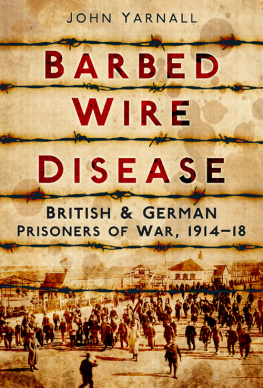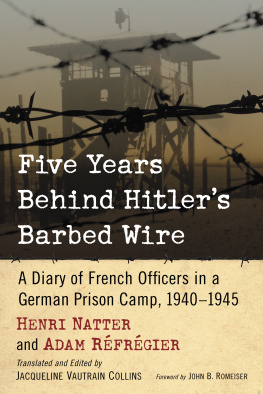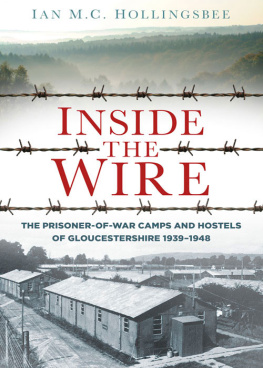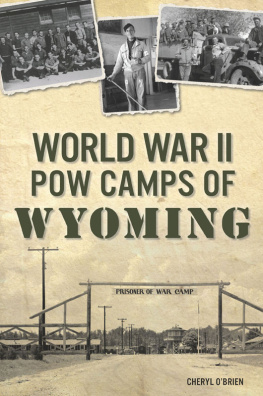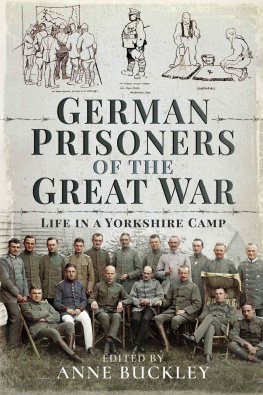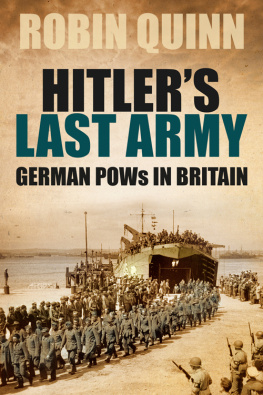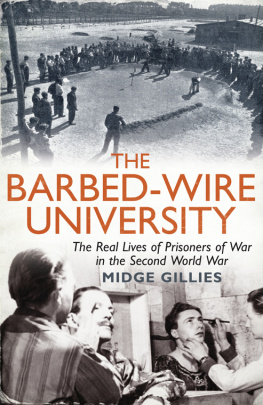EUMENES Publishing 2019, all rights reserved. No part of this publication may be reproduced, stored in a retrieval system or transmitted by any means, electrical, mechanical or otherwise without the written permission of the copyright holder.
Publishers Note
Although in most cases we have retained the Authors original spelling and grammar to authentically reproduce the work of the Author and the original intent of such material, some additional notes and clarifications have been added for the modern readers benefit.
We have also made every effort to include all maps and illustrations of the original edition the limitations of formatting do not allow of including larger maps, we will upload as many of these maps as possible.
We Prisoners of War
Sixteen British Officers and Soldiers Speak from a German Prison Camp
Edited by Tracy Strong
We Prisoners of War was originally published in 1942 by Association Press, New York.
* * *
Preface
Two years after the outbreak of hostilities, more than four million men are prisoners of war. They are living behind barbed-wire fences in all parts of the world. While in the hands of a hostile Power, they retain their full civil status as soldiers out of luck and live under conditions agreed to by forty-seven nations in the Geneva Convention relative to the treatment of prisoners of war. These conditions are not easy, but they are softened somewhat through the mediation of what the treaties call the High Protecting Powers of enemy interests in the belligerent countries and the humanitarian services of the International Red Cross and the Worlds Committee of the Young Mens Christian Associations.
What thoughts are in the minds of these captured men? We Prisoners of War is a partial answer to this question. These sixteen essays, written by British officers and soldiers in a German prisoner-of-war camp, were originally submitted in an essay contest suggested by a Y.M.C.A. secretary who visits the camps regularly. They were not intended for publication or the eyes of the censor. Because of their unique insight into the minds of those facing despair in a sea of stagnant idleness, they are being printed in the interest of the prisoners themselves, after permission was secured from them and from the German and British military authorities. No changes were made or suggested by the military censors.
Although these prisoners are shut in behind barbed wire in southern Germany, it is interesting to note the influence upon their thoughts of the life of the villages outside the wire. A bright carpet in a cottage, the visitors in the local beer garden, the glorious view of the Alps as seen through the barred windows, as well as the clanging of the church bells, the singing of the birds, and the memory of the young choirmaster, Mozart, who lived therethese are food for thought.
It is striking to observe how these twentieth-century prisoners of war, with their piercing insight, join the company of such famous prisoners of history as St. Paul, Bolingbroke in Richard II, the Prisoner of Chillon, and Robinson Crusoebut with this significant difference: that the modern prisoner has the right and opportunity to study, to play, to pray, and prepare himself for the post-war period. This is made possible by the organization of activities in the camp, the generosity of friends, the co-operation of the enemy, and the direct help from international societies.
It is heartening, yet strange, to discover in these essays the absence of bitterness, cynicism, pride, and hatred. Even the shortage of food, forced privation, and lack of privacy do not harden these mens hearts or quench their spirits. The suffering and danger through which they have lived does lead them to ponder on the triviality of human life, but their reflection usually leads to a determination to live in hope and faith, and to prepare for a new world.
TRACY STRONG
December, 1941
1. So, Hamish, He Was a Prisoner
So, Hamish, he was a prisoner. He had expecteddeath? Almost certainly yes. His mind had been made up on that at best; questionably, disfigurement or, if fate was very kind, a Blighty wound that might send him home for a time; but not thiswhat could he call it, how describe it? And as this first steaming day of shattering new experience drew to its close, finding Hamish exhausted, flat on his back, amongst hundreds of others (few of them, alas, his own comrades), with sleep still far away from him, he began to think and wonder, and a great thought that he had never had before came.
It struck him as strange that he, inconspicuous as he was (or at any rate felt himself to be), very much of an also-ran in the race of life so far, should be amongst the few of his fellows left alive. So many of them had been more worthy than he could ever be of attaining the good things that life had to offer, of returning to their own again, tested by the mighty fires of war, knowing themselves men. Why should he remain? What did it all mean? The outward forms of religion had never meant a great deal to him, though he supposed he had always had a deep-founded respect for the God his mother had taught him about, so that he quite believed that those odd people with peculiar convictions, chapel-goers, and others who appeared not quite normal might have some reason to expect God would provide especial protection for those who gave him special attention. But for himself? Slowly he realized, and the realization grew, that those passages he could recall in the Bible about being the children of God did really mean something very personal, that the Ninth Psalm was not altogether mere fine words, for he had placed himself unreservedly in the hands of God. He had simply endeavored to do his duty by his country and his best as he knew it; he had seen men fall on his right and left, destruction all around himbut he, he had been spared. Undoubtedly, his prayer had been heard. He decided that, from now on, he could have a new conception of God. It was evident that help was given to those who placed complete trust in Him, and who were prepared to help themselves as far as opportunity was given them to do so; for, surely, God was that opportunity.
It did not matter if, for a while, the flowers were not for him to pick; if many of the good things hitherto taken for granted were now to be denied him, for he knew for certain that there would always be sufficient, always enough to sustain him. For what purpose, he did not pretend to know, could not even guess; but the new conviction very definitely came to him that, inefficient as he might be, he was nevertheless indispensable to the Divine Need, had still a job to do, be it years ahead of him, for which he alone was suited. Meantime, he must forget himself and devote the energy that had been entrusted to him to making the lives of others in some small way more enjoyable, more happy, more aware of the Real, the True, indeed the love of God. This was to be the basis of life for him in future. A little rhyme of childhood days occurred to him. It seemed apt, if laughable:
Be kind to little animals, whatever sort they be,
and give to stranded jellyfish a shove into the sea!
With the subsequent days of hard marching under sweltering sun, little or no food or drink, continued crowding and crushing, sleeping and awake, eternal grumbles and complaints because the material comforts of life were lacking, many were the chances he found of testing his newly discovered source of happiness. He decided that, in many ways, he had never been happier, though life was harder than ever before. He found he could, as it were, imagine his old self reacting as the majority were doing with loss of face and faith; but that was behind him now, gone for ever. It seemed to him this new experience resembled that of having just been born again. Here one was absolutely dependent for the barest necessities on the kindness and charity of others; and when these were often wanting, how thankless life became for those who would not, or perhaps could not, be aware of the eternal loving kindness.


